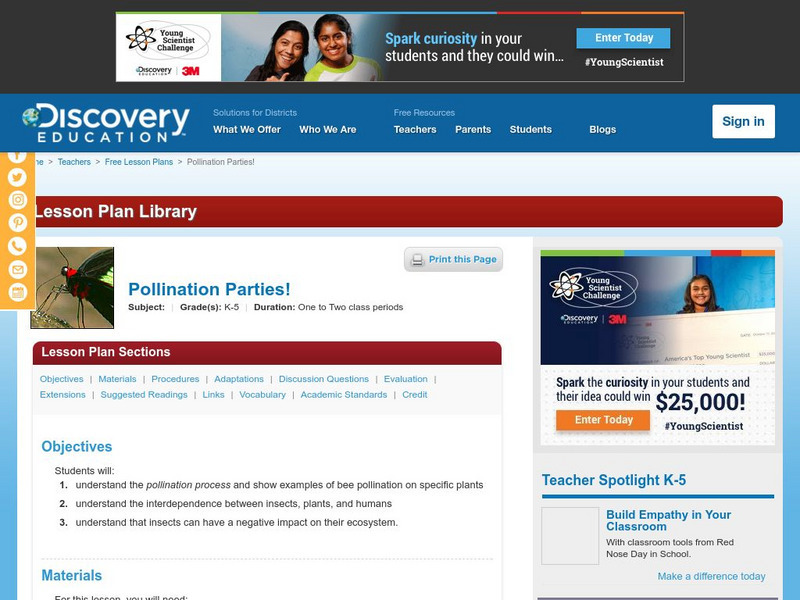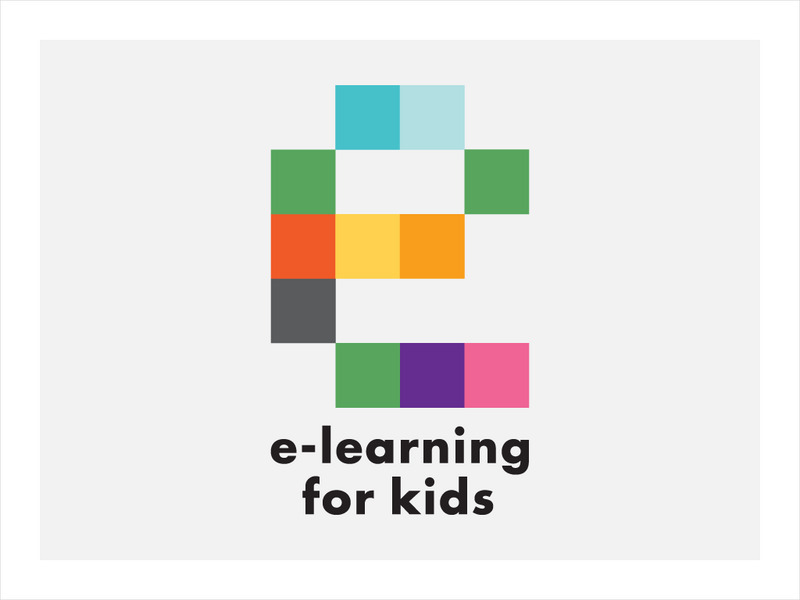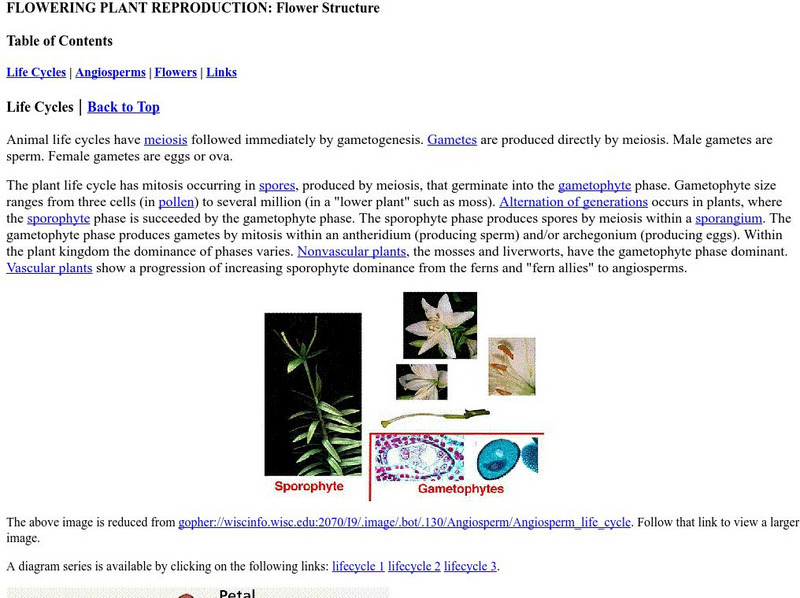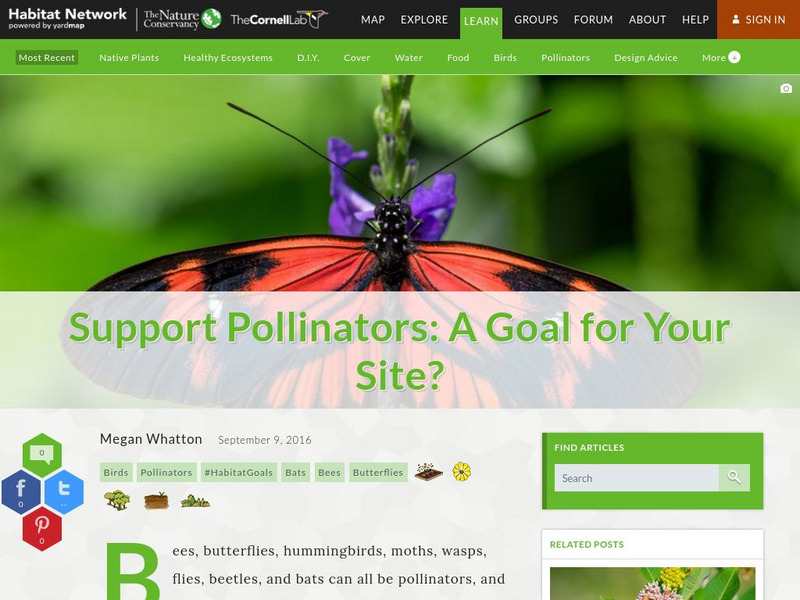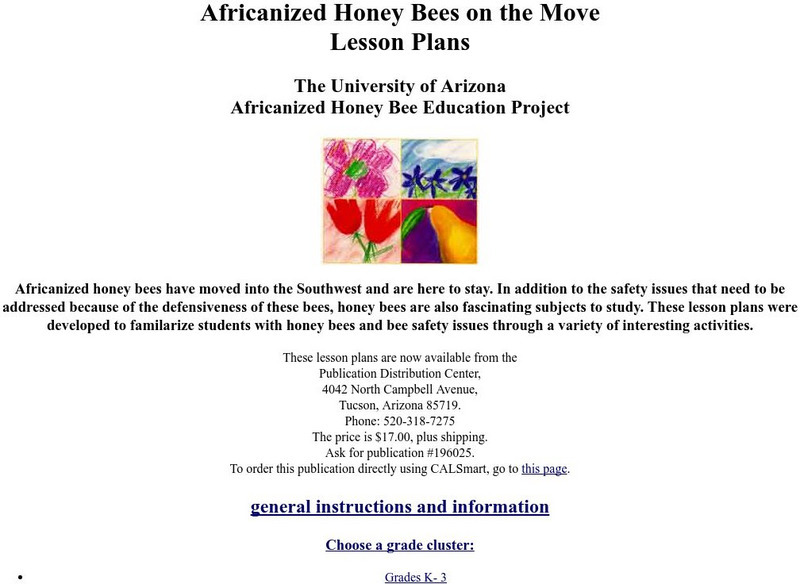Hi, what do you want to do?
Discovery Education
Discovery Education: Pollination Parties
This lesson helps students understand the concept of pollination. Objectives, materials, procedures, adaptations, discussion questions, evaluation, extensions, suggested readings, links, vocabulary, and academic standards are all included!
PBS
Pbs Learning Media: Reclaiming Habitat for Honeybees
Explore the role of pollinators in their ecosystems, develop a written response to one of three questions about the importance of honeybees, gather evidence about Coal Country BeeWorks' efforts to reclaim surface mining sites,.
University of Illinois
University of Illinois Extension: Plantenstein Is the Suspect!
Detective Le Plant has discovered that one plant can produce many other plants. He needs you to help him find out how this happens. Follow along and learn about the parts of flowers and reproduction. Along the way, you will be quizzed!
Biology Pages
Kimball's Biology Pages: Sexual Reproduction in Angiosperms (Flowering Plants)
This site, from retired Harvard professor John W. Kimball, provides a detailed but understandable explanation of sexual reproduction in flowering plants. Includes informative, well labelled illustrations.
E-learning for Kids
E Learning for Kids: Science: Hawaii: What Happens in the Life Cycle of a Flowering Plant?
Sophie and Max are growing plants in their greenhouse. Join them, and learn about the life cycle of a plant.
PBS
Pbs Learning Media: Pollination
Students are asked to explain the relationship between a bee and a flower.
University of Nebraska
University of Nebraska State Museum: Pollen Detective: About Pollen
Twelve different species of plant pollen are highlighted in this engaging resource. For each plant you can view pollen as seen under two different kinds of microscopes. Reproductive cycles and physical traits used for identification are...
Estrella Mountain Community College
Estrella Mountain Community College: Flower Structure
Site covers all aspects of plant reproduction such as life cycles, angiosperms and flowers. Provides links to other sites to aide in research.
Smithsonian Institution
Smithsonian Education: Partners in Pollination
Here is a three-part lesson plan on the plant and animal relationship in respect to pollination.
Estrella Mountain Community College
Online Biology Book: Flowering Plant Reproduction: Fertilization and Fruits
Microscopic images, detailed information, and illustrated diagrams help explain plant reproduction with a focus on fertilization.
TED Talks
Ted: Ted Ed: How Bees Help Plants Have Sex
Fernanda S. Valdovinos explains how intricate pollination networks work and how it can all change from one season to the next. [5:25]
Cornell Lab of Ornithology
Habitat Network: Support Pollinators: A Goal for Your Site?
Find out the three easy steps citizens can take to support pollinators including providing shelter and nesting materials, food, and avoiding using chemicals like pesticides and fertilizers.
National Audubon Society
National Audubon Society: Audubon Adventures: The Pollination Story
A colorful, interactive chart illustrating the stages in the pollination of flowers by bees.
Other
Florida Gardener: Flower Parts
Learn about the parts of a flower. Do all flowers have the same parts? Do all flowers reproduce in the same manner? Answers to these questions and more are found here, along with many defined terms.
Other
Biology: Evolution of Sexual Reproduction
This paper, the work of a Ph.D. researcher, presents an interesting discussion of the reasons that assexual reproduction is not used by most organisms. Toward the end is a specific discussion of reproduction in plants. Advantages and...
University of Arizona
University of Arizona: Africanized Honey Bees on the Move
This is a lesson plan for grades 9 - 12. There are worksheets that can be printed out. Each activity and objective is stated.
NC State University
Beekeeping Insect Note: Cucumber Pollination
How many bees do you need to pollinate cucumbers? How do you maintain the hives? Answers to these questions and more.
Science & Plants for Schools
Science & Plants for Schools: Pollination, Fertilization, Fruits [Pdf]
Great PDF to teach learners about plant reproduction and life cycle. There are many teacher printables.
Scholastic
Scholastic: Study Jams! Science: Plants: Flowers
A video and a 7-question multiple-choice quiz on the structure and functions of flowers.
Other
What Is Pollination?
This website answers the questions: What is pollination? What is a pollinator? What are the benefits?
Smithsonian Institution
Smithsonian National Zoo: Zoogoer Magazine: Saving Pollinators
This is a lengthy article that examines facts and information related to pollinators and the critical need they fulfill.
Scientific American
Scientific American: The Buzz on Bees: In Depth Reports
Read this multimedia article about the disappearance of bee colonies worldwide. Find out why it is crucial to saving this important pollinator from extinction.
CK-12 Foundation
Ck 12: Biology: Bird Ecology
[Free Registration/Login may be required to access all resource tools.] Discusses the diversity of bird habitats and food sources.
Other
Science Learning Hub: Pollination: Attracting Pollinators
Flowers are dependent on various means to transport their pollen. Transfer by animals, insects, birds, bats, and wind are five methods for pollination to occur that are described here.





